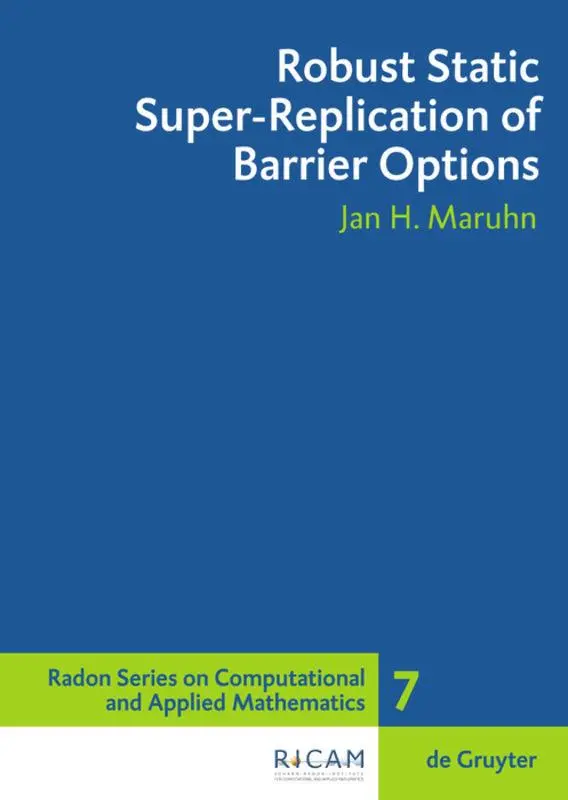48,14 €
Versandkostenfrei per Post / DHL
Aktuell nicht verfügbar
Among the book¿s several unique features is its analysis of a large class of algorithms of the Learning Theory that essentially comprise every linear regularization scheme, including Tikhonov regularization as a specific case. It also provides a methodology for analyzing not only different supervised learning problems, such as regression or ranking, but also different learning scenarios, such as unsupervised domain adaptation or reinforcement learning. By analyzing these topics using the same theoretical framework, rather than approaching them separately, their presentation is streamlined and made more approachable.
An Introduction to Artificial Intelligence Based on Reproducing Kernel Hilbert Spaces is an ideal resource for graduate and postgraduate courses in computational mathematics and data science.
Among the book¿s several unique features is its analysis of a large class of algorithms of the Learning Theory that essentially comprise every linear regularization scheme, including Tikhonov regularization as a specific case. It also provides a methodology for analyzing not only different supervised learning problems, such as regression or ranking, but also different learning scenarios, such as unsupervised domain adaptation or reinforcement learning. By analyzing these topics using the same theoretical framework, rather than approaching them separately, their presentation is streamlined and made more approachable.
An Introduction to Artificial Intelligence Based on Reproducing Kernel Hilbert Spaces is an ideal resource for graduate and postgraduate courses in computational mathematics and data science.
Sergei V. Pereverzyev is Professor and Senior Fellow of the Johann Radon Institute for Computational and Applied Mathematics, Austrian Academy of Sciences. He is the second recipient of the International Prize for Achievement in Information-Based Complexity (2000), and the inventor of a patented innovation in diabetes technology (2019). He is also the author of two monographs, over one hundred scholarly articles and serves as a member of editorial boards of such international journals as Applied and Computational Harmonic Analysis, Journal of Complexity, Computational Methods in Applied Mathematics, International Journal on Geomathematics, Journal of Diabetes & Metabolism, Frontiers in Applied Mathematics and Statistics, International Journal of Wavelets, Multiresolution and Information Processing. He was principal investigator and person in charge of several research projects granted by research programs FP7 and Horizon-2020, the Austrian Science Fund (FWF), the Austrian Research Promotion Agency (FFG) and the German Research Foundation (DFG).
Explores statistical learning with reproducing kernels, offering insight on trends associated with deep neural networks
Analyzes a class of algorithms of the Learning Theory, comprising most linear regularization schemes
Offers a methodology for analyzing various supervised learning problems
Introduction.- Learning in Reproducing Kernel Hilbert Spaces and related integral operators.- Selected topics of the regularization theory.- Regularized learning in RKHS.- Examples of Applications.
| Erscheinungsjahr: | 2022 |
|---|---|
| Fachbereich: | Analysis |
| Genre: | Mathematik, Medizin, Naturwissenschaften, Technik |
| Rubrik: | Naturwissenschaften & Technik |
| Medium: | Taschenbuch |
| Inhalt: |
xiv
152 S. 2 s/w Illustr. 6 farbige Illustr. 152 p. 8 illus. 6 illus. in color. |
| ISBN-13: | 9783030983154 |
| ISBN-10: | 3030983153 |
| Sprache: | Englisch |
| Einband: | Kartoniert / Broschiert |
| Autor: | Pereverzyev, Sergei |
| Auflage: | 1st edition 2022 |
| Hersteller: |
Springer Nature Switzerland
Springer International Publishing |
| Verantwortliche Person für die EU: | Springer Basel AG in Springer Science + Business Media, Heidelberger Platz 3, D-14197 Berlin, juergen.hartmann@springer.com |
| Maße: | 235 x 155 x 9 mm |
| Von/Mit: | Sergei Pereverzyev |
| Erscheinungsdatum: | 18.05.2022 |
| Gewicht: | 0,296 kg |












